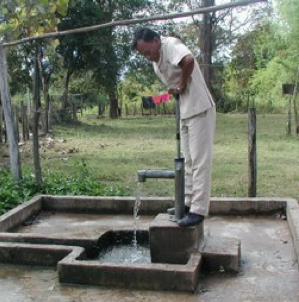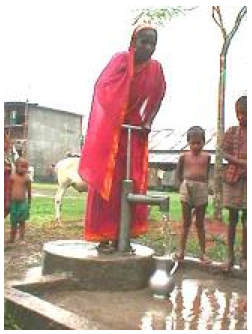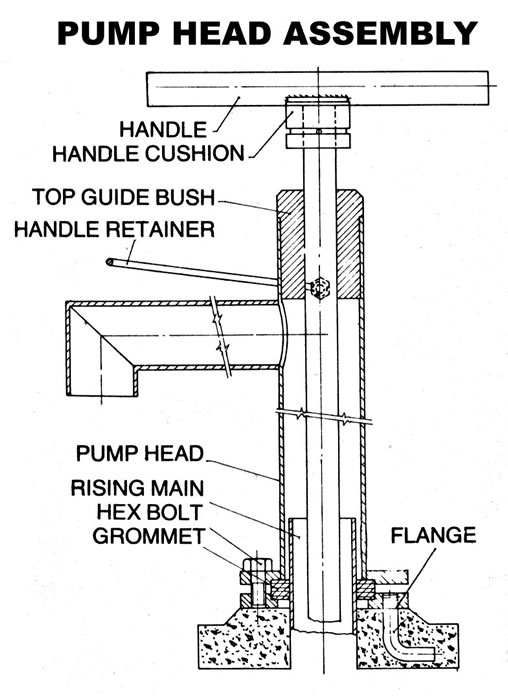Tara pump
| |
|
|
|
|
|
|
|
|

The Tara Pump is a “Direct Action Pump for Low Lift Wells”. It uses a buoyant pump rod that helps to reduce the forces on the handle. It is not designed for heavy-duty use, and can serve small communities of 100 persons. The maximum recommended lift is 15 m. The Tara Pump is a public domain pump defined by RWSN specifications and Indian Standards. The Tara Pump is fully corrosion resistant. It is easy to install and has excellent potential for community-based maintenance.
The Tara is a direct action pump initially developed in Bangladesh as a measure to counteract the dropping water table that exceeded the range for suction pumps. The Tara Direct Action is one of the most successful medium lifts pumps. Is has been included into the Indian standards.
The pump is fully corrosion resistant since all underground parts are made of noncorrosive materials like PVC or stainless steel. Tara pumps are designed for lifting water from bore wells with static water level not exceeding 15 m. The hermetically sealed pump rod, of a relatively large diameter, is buoyant. It displaces water in both the upward and downward stroke and the buoyancy of the pump rod makes pumping operation easy.
It is designed as family pump for serving user groups of about 20 to 100 people. It can be used for irrigation of family gardens. Like all direct action pump the operation is not ergonomically favourable, therefore prolonged pumping is not recommended.
Contents
[hide]Maya-Yaku pump, a Tara pump alternative
The Maya-Yaku direct action pump is a version of the Tara pump that is used in Central-America and Bolivia. It is slightly different from Tara regarding the use of materials in certain components, but the changes do not alter the basic principles of the original design.
The simplicity of the design means that it is straightforward to maintain and repair.
- Maximum depth: 14 metres
- Capacity: 40 litres per minute
- Can serve up to: 50 people.
For more on the Maya-Yaku pump: Bomba de Accion Directa (Maya - Yaku).
Suitable conditions

A pump for drinking water and limited use for irrigating gardens.
These pumps are used very extensively in India , Bangladesh, Laos, other parts of East Asia and Africa.
|
Pumping depth (Lift): |
up to 15m |
| Cylinder diameter: | 50 mm |
| Stroke: | Variable |
| Yield: | (75 watt input, at 5 m head) ~ 3 m³/hour |
| Population served: | 20-100 |
| Type of well: | borehole drilled with sludging method |
Construction, operations and maintenance

The down hole components like rising main and pump rod pipes are made of standard up pipes; the pump rod is buoyant. The plunger and foot valves are injection moulded plastic; The only non-plastic components are made of stainless steel, thus the pump is corrosion resistant.
The direct action handpump is designed for easy installation. No lifting equipment or special tools are needed. The pumps are generally installed in collapsible boreholes drilled with the sludger method.
Industrial production: large scale production in local industrial units. The plastic moulding requires specific equipment and skills.
Costs
Approx US$ 100-200 including tube well (depending on installation depth and drilling method).
Manuals, videos and links
- BAUMANN, E. (2011) Low Cost Handpumps. RWSN Field Note 2011-3, RWSN, St Gallen, Switzerland.
- ERPF, K. (2005) Tara Handpump Specifications (First Edition). First Edition, Skat, Rural Water Supply Network, St Gallen, Switzerland.
- BAUMANN, E.. The Maya-Yaku pump: Bomba de Accion Directa (Maya - Yaku). Skat & Rural Water Supply Network. 1993.
